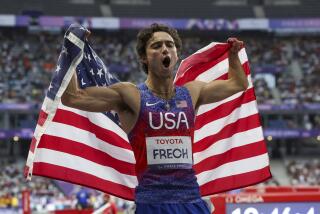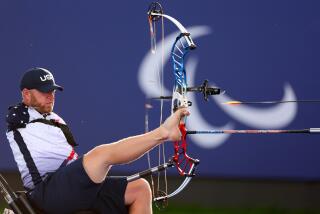US teams look for future Paralympians at scouting combines
BOSTON — Two years after losing his lower leg in a car crash, Matthew Freitas is faster and stronger than ever.
The 14-year-old is nearing a 6-minute mile on the track, running with a prosthetic foot. He was the star goalie on his youth lacrosse team, and next spring the freshman will compete for his high school’s squad. His swift progress has stunned doctors, teammates and, to his delight, opponents.
“Before games, I hear a lot of people going, ‘Oh, that goalie has one foot. It’s going to be easy to score goals on him,’” said Freitas, of Weymouth, Massachusetts, on the state’s south shore. “Last game I heard somebody say that, we won 6-0, and I ran full-field and scored a goal.”
But lately, he’s been training for something else: This weekend, Freitas will join other athletes with physical and visual disabilities hoping to get noticed at a scouting event for the U.S. Paralympics. Coaches from national teams will run them through a circuit of tests, looking for the next top talent.
The event is one of four regional “Gateway to Gold” stops across the country, a campaign by the U.S. Paralympics to route promising athletes into the pipeline for national teams. In Boston, coaches will work with athletes to gauge their potential in swimming, rowing, skiing, and track and field events.
“It’s kind of like a combine, where they can come in and test themselves in all four sports,” said Joe Walsh, president of Adaptive Sports New England.
To qualify for a national team, Paralympic athletes have to prove their mettle among the world’s top competitors. Most spend years training for a spot. But scattered among the rosters of elite athletes are others who discovered their talent later, sometimes only by a fluke.
Before a scouting event in Boston last year, KateLynne Steinke had no interest in rowing. Coaches saw incredible potential, though, and urged her to compete. Within months, Steinke, who is paralyzed from the waist down, had finished eighth at the World Rowing Championships.
“There are a lot of athletes who are discovered by chance,” said Thomas Darling, director of para-rowing for the U.S., who spotted Steinke’s talent last year.
Part of the problem is that, with a relatively small population, those with disabilities struggle to find local competition.
“In any geographic area, it’s difficult to pull together 10 athletes who are all amputees, who are all running, who are all interested in track,” Walsh said.
But advocates said they’re starting to see a shift. In 2013, the U.S. Department of Education ordered all schools to give students with disabilities an equal opportunity to join their sports teams, as long as it doesn’t require a modification that fundamentally alters the competition.
More injured military veterans, too, are returning from combat to careers in adaptive sports.
“Some of them are really good athletes, and so they’re able to transfer the skills that they had growing up with sports into the analog Paralympic sport,” Walsh said.
About 50 athletes are expected to attend the Boston event on Sunday. Some are established athletes. For others, it’s a chance to try new sports. On one machine, athletes can pull two ropes to simulate cross-country skiing. With a laser rifle, they can test their accuracy for the biathlon.
Freitas knows he isn’t likely to be recruited to a national team’s development program this year. But coaches can help guide his training and keep an eye on him for that possibility later. With no Paralympic team in lacrosse yet, he’s looking instead to endurance sports like track and hand-cycling.
“My plan is to work my way around and get as much done as possible,” Freitas said. “I’m just trying to get better as an athlete all-around.”
Copyright 2015 The Associated Press. All rights reserved. This material may not be published, broadcast, rewritten or redistributed.
More to Read
Go beyond the scoreboard
Get the latest on L.A.'s teams in the daily Sports Report newsletter.
You may occasionally receive promotional content from the Los Angeles Times.










